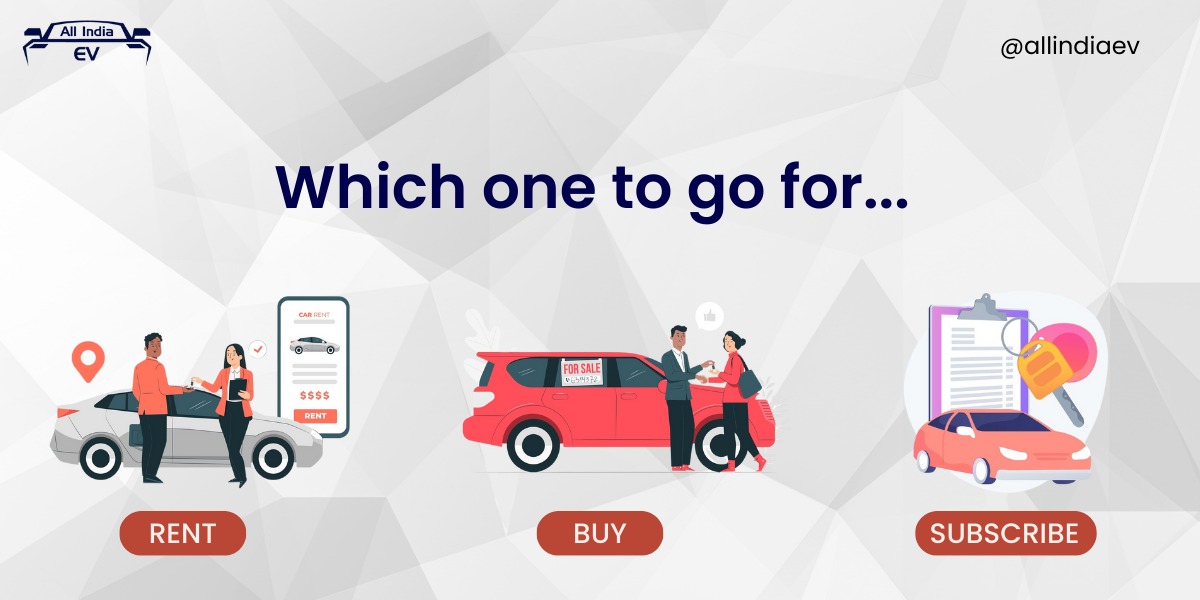
Buying, renting or subscribing to EV in India
The landscape of personal transportation is undergoing a significant transformation in India, with electric vehicles (EVs) at the forefront of this change. As the country makes strides towards sustainability and reducing carbon emissions, the adoption of EVs is being encouraged through various incentives and policies. This shift has introduced new paradigms for acquiring EVs: buying, renting, and subscribing. Each of these options presents a unique set of benefits and considerations for consumers.
Buying EVs in India
Buying an electric vehicle is the traditional route many opt for. It involves paying the full price upfront or financing the vehicle through a loan. The Indian government, under its FAME India Scheme (Faster Adoption and Manufacture of (Hybrid &) Electric Vehicles), offers subsidies to lower the purchase cost of EVs, making them more accessible to the average consumer. Additionally, many state governments offer additional incentives, such as reduced road tax and registration fees.
Pros:
✅ Ownership of the vehicle.
✅ Long-term cost benefits, as EVs generally have lower running and maintenance costs compared to traditional vehicles.
✅ Potential for appreciation in value if the EV becomes a classic or sought-after model.
Cons:
☑️ High initial investment, even after subsidies.
☑️ Concerns about battery life and replacement costs.
☑️ Limited charging infrastructure in certain areas.
Renting EVs in India
Renting is a flexible option for those who need a vehicle for a short period or prefer not to commit to a single vehicle. Various startups and established companies offer EV rentals on a daily, weekly, or monthly basis. This model is particularly popular among tourists, business travelers, and individuals looking to test drive an EV before making a purchase.
Pros:
✅ Flexibility to choose different vehicles as per need.
✅ No long-term financial commitment or depreciation concerns.
✅ Avoidance of ownership costs such as maintenance, insurance, and registration.
Cons:
☑️ Can be more expensive in the long run compared to buying.
☑️ Availability might be limited to urban areas.
☑️ Restrictions on usage, such as mileage limits.
Subscribing to EVs in India
The subscription model is a relatively new concept that combines the benefits of buying and renting. Customers pay a monthly fee to use an EV without the commitment of ownership. This fee typically covers maintenance, insurance, and, in some cases, charging costs. Subscription services offer the flexibility to upgrade or change vehicles, making it an attractive option for those who prefer to drive the latest models.
Pros:
✅ Lower upfront costs compared to buying.
✅ Includes maintenance and insurance, reducing the hassle of ownership.
✅ Flexibility to change or upgrade vehicles.
Cons:
☑️ Monthly payments can add up over time.
☑️ Limited control over the vehicle, as it remains the property of the subscription service.
☑️ Potential for additional fees, depending on the contract terms.
Indian companies providing EV rental or Subscription based EVs to consumers
Quiklyz:
Quiklyz, a neo-Indian vehicle leasing company, has launched its electric vehicle leasing service to address the high purchase cost of EVs in India. They provide EVs on a subscription model, making it more accessible for common users and businesses. Quiklyz offers a diverse portfolio of EVs, ranging from economical to luxury electric two-wheelers, three-wheelers, and four-wheelers. Their flexibility and convenience allow consumers to upgrade vehicles based on technological advancements and newer EV versions.
Yulu:
Yulu is a popular EV rental and ride-sharing startup in India. They provide electric bikes for rent. Yulu aims to promote sustainable mobility by offering convenient and eco-friendly transportation options to urban commuters.
Hoppr:
Hoppr is another EV rental and ride-sharing platform. They focus on providing electric vehicles for short trips within cities. Users can rent electric scooters and bikes through their app, contributing to reduced emissions and traffic congestion.
Bounce Share:
Bounce Share offers electric scooters for rent on a short-term basis. Their dockless system allows users to pick up and drop off scooters at convenient locations. Bounce aims to make last-mile connectivity efficient and environmentally friendly.
E-Savari Rentals:
E-Savari Rentals provides electric vehicle rentals across various cities in India. They offer electric cars, bikes, and bicycles for daily or weekly use. E-Savari focuses on promoting clean mobility solutions.
Tata Motors+ Orix Auto Infrastructure Services:
Tata Motors, in collaboration with Orix Auto Infrastructure Services, offers EVs on a subscription basis. This partnership aims to make electric vehicles more accessible to consumers by eliminating the upfront cost of ownership.
Avis India:
Avis India has partnered with Quikk India to create an electric vehicle fleet. They offer EVs for rent, catering to both individual users and corporate clients. Avis aims to contribute to sustainable transportation solutions in India.
These companies play a crucial role in promoting EV adoption, reducing carbon emissions, and providing convenient alternatives to traditional fossil fuel-powered vehicles
Moving Forward
The choice between buying, renting, and subscribing to an EV in India depends on individual needs, financial considerations, and lifestyle preferences. Buying is suitable for those looking for long-term investments and who prefer ownership. Renting offers flexibility and is ideal for short-term needs without the hassles of ownership. Subscribing combines elements of both, offering a middle ground with less financial burden upfront and more flexibility than outright ownership. As the EV market in India continues to evolve, these options are likely to become more tailored, offering consumers a range of choices to suit their needs.
